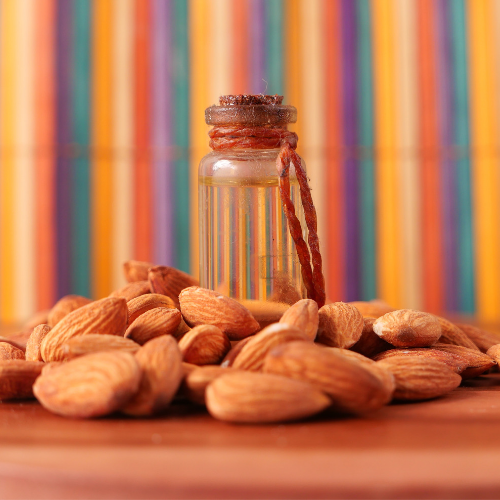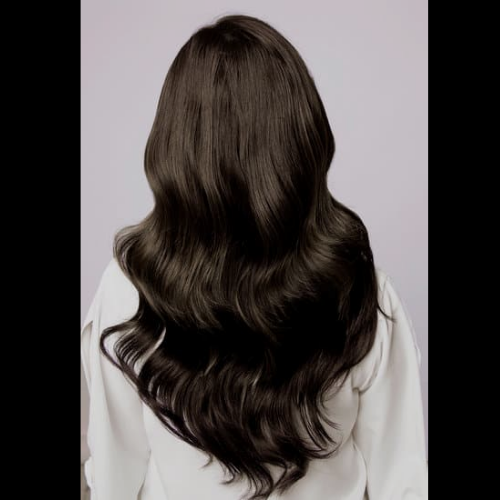Table of Contents
Hair care is a crucial element of personal grooming, and with the growing interest in natural therapies, individuals are turning to nature’s bounty for solutions to their hair concerns. Almond oil, produced from the seeds of almonds (Prunus amygdalus), has been a popular element in traditional and modern hair care for ages. Almond oil, which is high in important vitamins, minerals, and fatty acids, is an effective treatment for a wide range of common hair problems, including dryness, dandruff, hair loss, and damaged strands.
In this detailed tutorial, we will look at how almond oil can benefit your hair and how to incorporate it into your daily hair care regimen to naturally treat common hair problems.
What is Almond Oil?

Almond oil comes from the nuts of the almond tree, which is thought to have originated in the Middle East. There are two main forms of almond oil: sweet almond oil and bitter almond oil. Sweet almond oil is utilized in hair treatment because of its soothing characteristics and high vitamin content. This oil is light, non-greasy, and easily absorbed by the scalp and hair.
The oil contains a number of elements that are good to hair health, such as:
Vitamin E is an antioxidant that protects against hair damage and supports healthy development.
Omega-3 fatty acids: These necessary fatty acids nourish the scalp and hair follicles, resulting in better hair texture and gloss.
Magnesium is a mineral that can prevent hair thinning and loss.
Zinc is a trace mineral that promotes hair development and keeps the scalp healthy.
Protein: Almond oil contains amino acids, which strengthen hair and prevent breakage.
Now that we’ve covered the fundamentals of almond oil, let’s look at how it might help with specific hair concerns.
1. Almond Oil for Dry, Damaged Hair

Dry, brittle hair is one of the most prevalent hair issues that people confront. It can be caused by a number of circumstances, including excessive styling product use, heat treatments, pollution, or just a lack of moisture in the hair. Almond oil is a natural way to replenish moisture and vitality in dry, damaged hair.
How It Works:
Deep Hydration: Almond oil contains oleic and linoleic acids, which assist to nourish and hydrate the hair strands. These fatty acids help to lock in moisture and keep the hair from getting too dry and brittle.
Almond oil contains vitamins and antioxidants that feed the hair from root to tip, mending it.
Almond oil acts as a moisture sealant and prevents split ends from forming, leaving your hair feeling softer and healthier.
How to Use Almond Oil on Dry Hair:
Pre-Shampoo Treatment: Massage a good amount of almond oil into your hair, focusing on the ends. Allow it to sit for at least 30 minutes or overnight before washing with your regular shampoo. This will help restore your hair’s hydration and smoothness.
Leave-In Conditioner: After washing and towel-drying your hair, massage a small amount of almond oil into the ends. This works as a leave-in conditioner, hydrating and smoothing frizzy hair.
2. Almond oil for dandruff and dry scalp
Dandruff and a dry, flaky scalp can cause discomfort and shame. Almond oil can help soothe itchy, dry scalps while also reducing the apparent flakes associated with dandruff.
How It Works:
Moisturizes the Scalp: Because almond oil hydrates both the scalp and the hair, it helps to prevent dandruff. The rich fatty acids feed the scalp, keeping it from becoming flaky and inflamed.
Soothes Itching: Almond oil’s anti-inflammatory qualities can help relieve itchy scalps caused by dryness or dandruff. It reduces irritability and provides relief.
Improves Blood Circulation: Massaging almond oil into the scalp increases blood circulation, which promotes healthy hair development and protects against scalp problems such as dandruff.
How to use almond oil for dandruff:
Scalp Massage: Warm up a little amount of almond oil and gently massage it into your scalp for 5-10 minutes. Leave it on for at least 30 minutes before removing with a gentle shower.
Overnight Treatment: For a more extensive treatment, massage almond oil into your scalp and hair before wrapping it in a towel or shower cap overnight. Wash it off in the morning to reveal a revitalized and moistened scalp.
3. Almond Oil Promotes Hair Growth

Hair thinning and loss can cause distress for both men and women. While genetics, stress, poor diet, and hormonal fluctuations all contribute to hair loss, almond oil can help promote healthy hair development and reduce shedding.
How It Works:
Strengthens Hair Follicles: Almond oil’s high protein content strengthens the hair follicles, reducing breaking and shedding. The oil feeds the hair at the root, resulting in healthier hair growth.
Increases Circulation: Massaging almond oil into the scalp promotes blood flow, which is necessary for good hair development. Improved circulation aids in the availability of nutrients to the hair follicles, promoting growth.
Prevents Hair Fall: Almond oil contains magnesium, a mineral that is believed to help prevent hair loss and thinning. It strengthens the roots, making the hair less likely to break.
How to Use Almond Oil for Hair Growth?
Scalp Massage for Hair Growth: Use warm almond oil to gently massage your scalp in circular motions. This improves blood flow and ensures that the oil reaches the follicles.
Overnight Treatment: For best results, apply the almond oil overnight and wash it off the next morning. Regular application of this therapy can help accelerate growth and increase hair thickness over time.
4. Almond oil for frizz control
Frizzy hair is a common condition, particularly in humid regions or among those with naturally curly or wavy hair. Almond oil may smooth and reduce frizz, making your hair look lustrous and finished.
How It Works:
Seals the Hair Cuticle: Almond oil contains natural emollients that help smooth the outer layer of hair (the cuticle), which reduces frizz and flyaways. By locking in moisture, almond oil keeps hair from blowing up and becoming unmanageable.
Adds Shine and Smoothness: The oil forms a glossy film on the hair, making it look shinier and smoother. This makes frizzy hair look healthier and more manageable.
Lightweight Formula: Unlike other heavy oils, almond oil is lightweight and non-greasy, making it great for frizzy hair without adding weight.
How To Use Almond Oil For Frizz:
After washing and towel-drying your hair, apply a tiny amount of almond oil to the moist hair. Smooth and manage frizz by focusing on the ends and middle lengths.
As a Hair Serum: If your hair is severely frizzy, use almond oil as a mild serum. Simply rub a drop or two between your palms and smooth it over your hair, concentrating on the ends and regions where frizz is most visible.
5. Almond Oil Promotes Hair Shine and Luster

Lack of shine can make your hair appear drab and lifeless. Whether your hair is straight, curly, or wavy, using almond oil into your hair care routine will help restore its natural luster and shine.
How It Works:
Nourishes and Conditions: The combination of fatty acids, vitamins, and minerals in almond oil deeply nourishes and conditions the hair, restoring its natural shine.
Protects against Environmental Damage: Almond oil forms a protective barrier around the hair, preventing damage from UV radiation, pollution, and heat styling.
Improves Hair Texture: Regular usage of almond oil can make your hair softer and more manageable, improving its overall appearance.
How to Use Almond Oil for Shine?
Shine Boosting Treatment: After styling your hair, add a few drops of almond oil. It adds shine and helps reduce flyaways, leaving your hair polished and lustrous.
Pre-Shampoo Mask: To add shine, apply almond oil before shampooing. Apply it to your hair and let it sit for 30 minutes before rinsing it out.
6. Almond Oil for Scalp Health
A healthy scalp forms the foundation for good hair. Almond oil can help keep a healthy scalp environment, which is essential for hair growth and overall health.
How It Works:
Almond oil regulates the production of sebum (natural scalp oil), which prevents both dry and oily scalp concerns. It promotes a healthy scalp, lowering the risk of clogged pores and oily buildup.
Fights Inflammation: Almond oil’s anti-inflammatory characteristics aid to relieve scalp irritation, itching, and inflammation, producing a quiet and healthy scalp environment.
Almond oil significantly hydrates the scalp, which is critical for encouraging healthy hair development and avoiding dryness-related scalp concerns.
How to Use Almond Oil for Scalp Health?
Scalp Massage for Health: Gently massage almond oil into your scalp to promote circulation and keep it moisturized. Leave it on for 30 to 60 minutes before washing it off with a gentle shampoo.
Add Essential Oils: For additional scalp benefits, combine almond oil with a few drops of essential oils such as tea tree or lavender. These oils may contain extra antibacterial, anti-inflammatory, or relaxing effects.
Conclusion
Almond oil is a highly flexible and natural solution for a wide range of hair problems, including dryness, frizz, hair loss, and dandruff. By including almond oil into your hair care routine, you can get the benefits of its nourishing, hydrating, and strengthening capabilities, resulting in healthier, shinier, and easier to manage hair.
Remember to always use high-quality, pure sweet almond oil for the greatest results. Whether used as a pre-shampoo treatment, a leave-in conditioner, or a scalp massage oil, almond oil is an excellent complement to any hair care routine. Say goodbye to harsh chemicals and embrace almond oil’s natural potential to improve the health and appearance of your hair.

fda approved canadian pharmacies
canadian pharmacy no presciption
trust online pharmacy
viagra no prescription